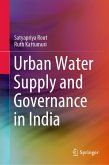While gender has been recognized as a key intervening variable in achieving equitable water access, most studies fail to acknowledge the deep interrelations between social structures and patterns of water use. Proof of these shortcomings is the enduring lack of data on water accessibility, availability and utilization that sufficiently acknowledgesthe relational nature of gender and other categories of power and difference, like class and socioeconomic status, as well as their comprehensive analysis. This book addresses this major research gap.
Dieser Download kann aus rechtlichen Gründen nur mit Rechnungsadresse in A, B, BG, CY, CZ, D, DK, EW, E, FIN, F, GR, HR, H, IRL, I, LT, L, LR, M, NL, PL, P, R, S, SLO, SK ausgeliefert werden.









